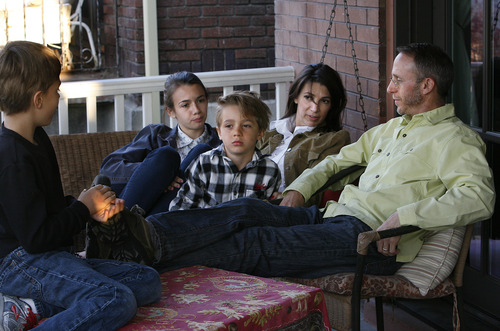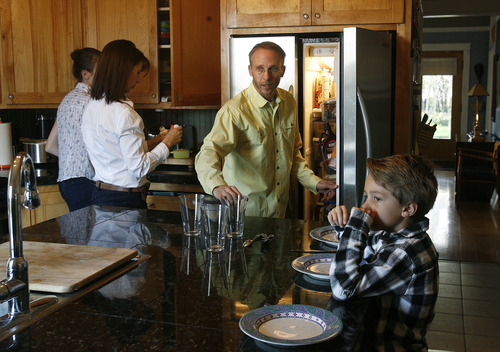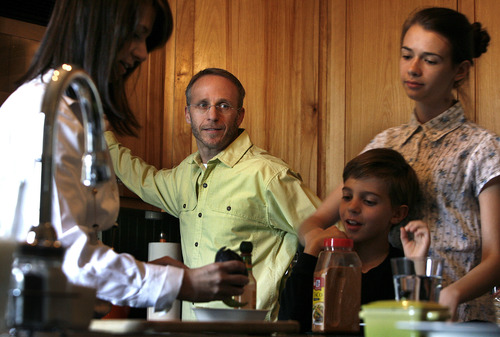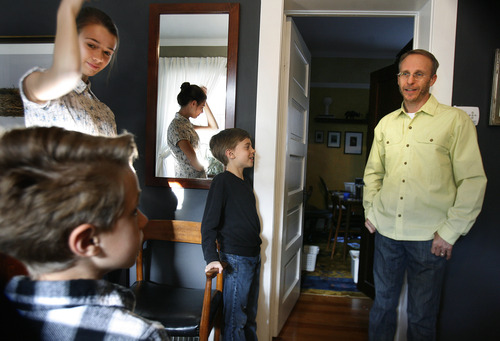This is an archived article that was published on sltrib.com in 2013, and information in the article may be outdated. It is provided only for personal research purposes and may not be reprinted.
Paul Lee got more than a new bride when he married Merrie Campbell. He also got a new stepdaughter, Izzy Peterson. Izzy was 5 at the time, and developing a bond was important to Lee, but he knew there were boundaries.
"There's a creep factor when all of a sudden some guy is coming into the house," Lee said. "I wasn't sure about the parenting role and how I fit into that."
Like Lee, more Americans are finding themselves navigating the complicated territory of stepfamily relationships. Research shows about 10 percent of children in the U.S. live with a stepparent at any one time, and a third will be part of a stepfamily before they reach age 18.
Brigham Young University associate social work professor Kevin Shafer wanted to find out what factors influence closeness between stepfathers and children.
"A lot of people want to know how to have a successful stepfamily and how to make the relationship work for everyone in the household," Shafer said. "As social workers, this is really important work for us."
After analyzing survey data from more than 1,000 families, he and graduate student Todd Jensen reached a couple of conclusions. One is that couples who fight less and agree on how to parent — for example, who disciplines and how they should discipline — fostered stronger ties with stepchildren. They also found that maintaining open communication between a mother and her children affected the closeness between children and a stepfather.
Jensen says the findings "confirmed our suspicions."
"We speculated that children had important things to say," he said.
This view runs counter to many self-help books on the market, Shafer says, which advise new couples to focus primarily on their own relationship and then everything else will fall into place.
"There is more hesitance among children to talk with mom about a new stepdad," he said. "A lot of kids feel like they become ignored and become a secondary concern to their mothers" when they remarry.
The researchers also found that income and education levels don't play a big role in building close bonds within stepfamilies.
"That's a hopeful message," Shafer said. "You can build good relationships without having to have a lot of money or resources."
The findings, published in the journal Social Work, validate what Ashley Thorn sees in her practice at Wasatch Family Therapy in Holladay. Thorn, who specializes in counseling stepfamilies and teaches stepfamily classes, says the most common issue she hears from children is they don't have enough time with their biological parent.
"Kids are going through a lot," Thorn said, "and they need an outlet for their emotions."
On the other hand, new couples feel they need to work on their new relationship and present a united front. Thorn says that's a valid point.
"If a stepparent can't get on the same page," she said, "then those kids will rip [the couple] right apart."
She notes that it takes about four years for stepfamilies to settle into their new roles, too long for many stepfamilies (60 percent of stepfamilies break up). But she says those who can agree on consequences and set realistic expectations are better able to negotiate what is tricky terrain for everyone involved.
"Most kids adjust really well," Thorn said. "[Stepfamilies] can work better than people think."
Stepfather Lee credits Merrie Campbell-Lee and Izzy's father, Ed Peterson, for establishing rules and roles early on so both sets of parents were on the same page. Lee describes his relationship with Izzy — now 16 — as "more like friends than father-daughter."
"She told me to say that it's easy when you've got the perfect stepdaughter," he laughed.
Twitter: @jnpearce —
Creating stepfamily harmony
Keep communication lines open. Children experience more stability and can develop closeness to a stepfather when they can openly communicate with their biological mother.
Get on the same page. When children feel their mother and stepfather agree on parenting roles and fight infrequently, they are more likely to bond with their stepfathers.
Nurture the couple relationship. Work on communication, demonstrate love and affection and take time to be together without the kids.
Be realistic. Instant bonds rarely happen. Give family members time to create shared memories and adapt to their new roles within the family.
Source: BYU research, Wasatch Family Therapy













